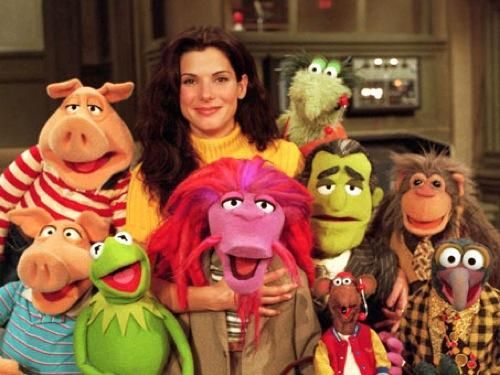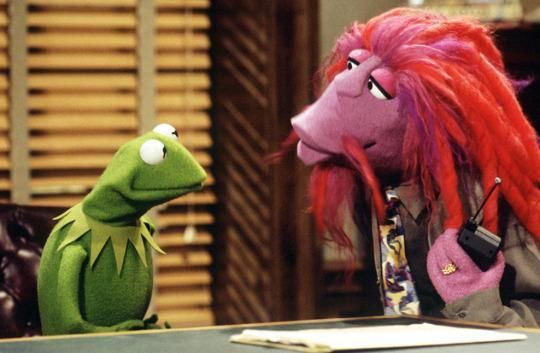I’m sure Disney’s choices after The Muppets (2011) were what they felt would best keep the momentum going for the world’s most famous puppets, but when the CG reboot of the Muppet Babies spinoff is your most successful follow-up, there’s trouble afoot. There was the underperforming sequel. There was the mockumentary-style network show that only lasted one season. There’s that Disney+ series that hasn’t matched one viral “Bohemian Rhapsody” cover from eleven years ago in impact. If all those misses weren’t bad enough, try having Frank Oz state for the record that new Muppet projects “[aren’t] true to the characters,” Disney doesn’t want him of all people involved anymore, and that dealing with Disney’s first effort to buy the Muppets helped kill Jim Henson. Given all that, it’s hard to believe the Muppets’ 2011 film was received as well as it was.
Frankly, I’ve never been able to love that movie either. There’s even something melancholy about it. The Muppets had saved their theater several times, on The Muppet Show and in Christmas specials, so the plot of the film felt less like a fresh new start than a safe retread. Reinforcing that feeling was the choice in Muppets: except for new addition Walter, the leads were the classic line-up from The Muppet Show, as if nothing had changed in the ensuing years. It seemed a final rejection of every new idea the Muppets tried in the wake of Jim Henson’s untimely death, on film, video, and most aggressively on television with Muppets Tonight.
Bringing the Muppets back to TV in a dedicated program seems to have been in the works before Henson’s passing. They had already been part of his short-lived The Jim Henson Hour in the mid-80s, and performer Kevin Clash recalled some discussion with Henson about a possible format for a new series. It may have involved mixing up the headliner Muppets, with Kermit made a more distant patriarch as Clash’s Clifford led the show. There might have been changes behind the scenes too thanks to the busy schedules of Henson and Oz, who admitted to Larry King that they discussed at least the possibility of handing off their characters to other performers within the group. Kermit and Miss Piggy’s first break-up was even planned. None of this was settled, and any early concepts would have been complicated had Henson and Disney come to terms over the sale of the Jim Henson Company. But Henson’s death, and that of performer Richard Hunt shortly after, scrambled everything.
Kermit and Piggy’s break-up was off. So was the Disney deal. Henson’s son Brian took up leadership of the company, and he brought the Muppets back to the movies with the heartfelt The Muppet Christmas Carol. There was no sign of Clifford; the only Muppet from outside the classic roster who made the film was Bean Bunny. While Kermit was immediately recast with Steve Whitmire, most of the characters Henson and Hunt performed went unused, or were left to brief, mute cameos. Kermit’s role was a supporting one, and the same was true for the characters performed by Oz; his directorial career had been eating into the time he had for puppeteering even before Henson’s death. Of the main Muppet cast, front and center for the first time was the Great Gonzo, paired with Rizzo the Rat. The two of them would lead most of the Muppet outings throughout the 1990s.
The one exception was Muppets Tonight, which was in development at the same time as Muppet Treasure Island. According to Brian Henson, that film was meant to “feather [into]” the new series. The premise of Muppets Tonight was that the troupe had their own network, KMUP, and aired a nightly variety series. It was a straightforward update on the vaudeville theater of The Muppet Show, but other changes were more dramatic. “We’ve got that core classic group, which is Kermit and Piggy, Fozzie and Gonzo,” Brian Henson said in promotional material. “[But] we quickly realized that if we put those guys right in the center of the show, there wouldn’t be much space for new character development. And what we wanted to do was create another sort of experimental, very creative atmosphere for Muppets Tonight that could grow new characters.”
The relationship between old and new was aptly illustrated in the opening song. Kermit still named the guest star, and Rizzo could be seen working in the control booth as PA, but the number was populated by new faces, led in song by Clifford. The old plan to have him host a Muppet series came to fruition with Muppets Tonight. The new Muppets and acts he introduced included evil veterinarian Dr. Phil Van Neuter, crooner Johnny Fiama and his gentleman’s monkey Sal Minella, Big Mean Carl, and the comedy stylings of Seymour the Elephant and Pepe the King Prawn. Behind the scenes, there was the long-nosed and high-strung director Nigel, Miss Piggy’s moronic nephews Andy and Randy Pig (who failed at every job they were given), and the security guard Bobo the Bear (twice as realistic as Fozzie, at half the brains).
Clifford was by nature a cool cat (or catfish, or humanoid, or whatever he’s supposed to be). Nevertheless, keeping all this insanity in line could be as trying for him as it was for his predecessor. Kermit and Gonzo were around to help, but Clifford’s chief support was Rizzo. These four were the most frequently appearing of the old guard. Frank Oz still had a busy schedule, and his characters had not yet been recast, so Piggy, Fozzie, Animal, and the rest were infrequent co-stars. And many of the characters left behind by Henson and Hunt were still benched. The desire to promote new characters may have been a factor in leaving them out. But the Muppet puppeteers have always been insistent that they are performers, not merely voice actors, and taking over characters from someone else is a difficult order. “I would avoid [doing someone else’s character] at all costs,” said Gonzo performer Dave Goelz. “Some characters never got reintroduced…partly we didn’t want to face it, and partly we didn’t know who could do it.” The Muppets aren’t the type of fictional troupe that would kill off characters, but without directly mentioning Henson and Hunt’s deaths, their characters’ hibernation in the 90s was as strong a mark as any of the loss.
No variety series can bat a thousand every time. Muppets Tonight had its duds. The way cross cutting between the acts and backstage was done meant that the audience only saw snippets of even the best sketches. Guest star involvement was often minimal. And Muppets Tonight had very little of the sweetness and tenderness that permeated so much of the original Muppet Show. But it was one of the most purely funny endeavors the Muppets have ever undertaken. Old characters found new roles they filled comfortably; Clifford and Rizzo particularly made a fine pair of exasperated managers, akin to Kermit and Scooter in the old show but playing to their own strengths. All the new characters and concepts gave the series a vitality that comes through in the humor. Uneven though it could be, all that new material was also in the spirit of Jim Henson. Except for Kermit and Rowlf, The Muppet Show was made up of all then-new additions to his puppet menagerie. And this was a man who ended The Muppet Show when it among the most popular TV series in the world to move onto the greener pastures of film.
Unfortunately, Muppets Tonight couldn’t catch a break in the ratings. ABC had so little confidence based on initial performance that they only aired ten of the first season’s 13 episodes. The Disney Channel picked up the series for another season, but it fared no better there. Brian Henson lamented “huge disagreements” with ABC about how to market the Muppets and was “hugely disappointed” when the show was canceled.
After Muppets Tonight, the troupe moved on to Muppets in Space, another uneven yet underrated production. It was one more Gonzo-centric story, with Rizzo as his sidekick. Van Neuter, Johnny and Sal, and Bobo all came along from Muppets Tonight. Clifford stepped back from the spotlight, but he was still around. Most notably, Pepe broke out from his partnership with Seymour to become one of the main Muppets, a scheming would-be Lothario who mixes it up with Gonzo and Rizzo. It was a flop at the box office, a worse performer than Muppets Most Wanted. In that failure to find an audience, Muppets in Space and Muppets Tonight aren’t so different from recent projects.
What is different, among other things, is a lack of experimental spirit. Even before the sale to Disney, the Muppets began retreating from the 90s. Rowlf, Scooter, and other retired characters were added back after recasting. The Frank Oz characters were handed off, allowing them to be front and center again. Except for Pepe and Clifford, everyone who first appeared on Muppets Tonight saw a gradual reduction in their presence. By the time of The Muppets (2011), most were nowhere to be seen. Pepe was reduced to a cameo for that film, as was Bobo. Rizzo didn’t appear at all, and Gonzo was put firmly back into a supporting role. It was as if the entire troupe were yanked by Disney into a pre-90s world to do a well-worn story. The only major innovation was a new cast member, Walter, whose everyman persona has been a niche filled by Kermit since the first Muppet Show.
Since then, the Muppets have continued to work with the original line-up, with little to no mention of anything that came later except Pepe and Bobo. Stories center on Kermit, Piggy, and Fozzie again. Gonzo and Rizzo are supporting players, if Rizzo is even around anymore after his performer Whitmire was fired. The Muppets Haunted Mansion this year represented something of a reversal; Johnny and Sal put in their first appearance in over a decade and the special revolved around Gonzo. The writing credits belong to longtime Muppet scribes and to Pepe's performer Bill Barretta. But there’s an awkwardness running through the special; Gonzo and Pepe are put together as if Pepe could easily be substituted for Rizzo. Treating the characters, and their performers, as interchangeable was among Whitmire’s issues with Disney before his firing, and among Oz’s complaints. The special is also a poorly-structured collection of sometimes funny scenes. And like The Muppets (2011) – and unlike what the troupe tried to do after Henson’s passing – the hackneyed moral of the story is just so much more recycled material from past episodes and movies.




